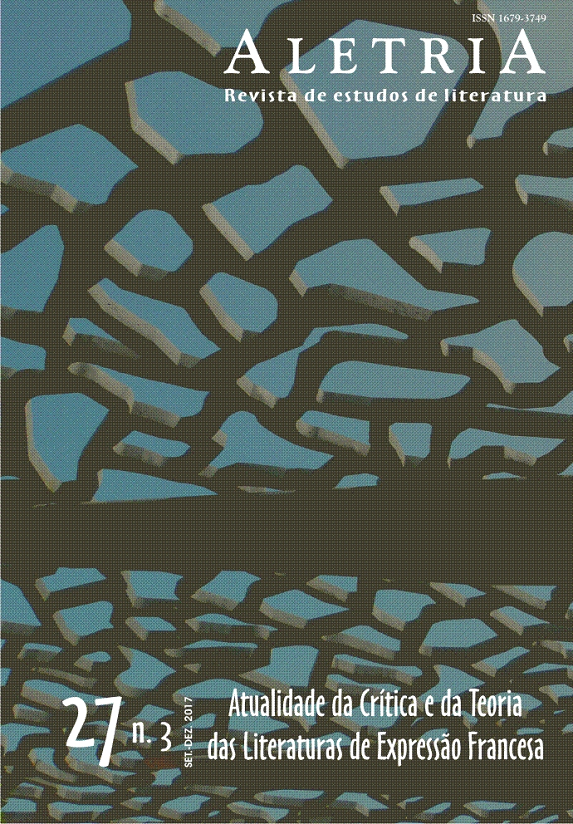The Poetry of Denis Roche. Proposal for a Protocol of Reading: an Erotic Pragmatic
DOI:
https://doi.org/10.17851/2317-2096.27.3.147-171Keywords:
Denis Roche, poetry, pragmatics, relevance, Jacques Lacan, protocol of readingAbstract
Denis Roche’s poetry is a poetry which both calls for a rereading for its own sake, because of the strength of its lyricism, and which raises key issues for theory and critique, from structuralism until the current revival of aesthetics. Taking into account previous readings by C. Prigent, J.-M. Gleize and D. Kunz, here is proposed and illustrated a protocol of reading defined as an erotical pragmatics. It is grounded in a pragmatic dimension of the poem whose relevance is not based on the search for understanding, but takes place on the scene where desire tells itself, as it has been analysed by Jacques Lacan. It is therefore suggested that the reading scene cannot be dissociated from the scene of writing, in other words aesthetics from poetics, which is always a singular poetics.
Downloads
References
ADAM, Jean-Michel. Linguistique textuelle. Des genres de discours aux textes. Paris : Nathan Université, 1999. (Collection Fac. Linguistique)
BAQUEY, Stéphane. Le primitivisme de Denis Roche. Lyrique amazonide. Paris : Éditions des Archives Contemporaines, 2008.
BAQUEY, Stéphane. Possibles de la poésie : Michel Deguy, Denis Roche, Jacques Roubaud. 2006. Thèse. (Doctorat) – Université Paris 8, Paris, 2006.
BARTHES, Roland. L’effet de réel. Communications, Paris, n. 11, 1968. [Rééd. In : GENETTE, Gérard ; TODOROV, Tzvetan (Dir.). Littérature et réalité. Paris : Seuil, 1982. p. 81-90. (Collection Points)]
BARTHES, Roland. Fragments d’un discours amoureux. Paris : Seuil, 1977. (Collection Tel Quel)
BARTHES, Roland. Introduction à l’analyse structurale des récits. Communications, n. 8, p. 167-206, 1966. [Repris in L’aventure sémiologique. Paris : Seuil, 2015. (Collection Points)].
BARTHES, Roland. S/Z. Paris: Seuil, 1970. (Collection Tel Quel). [Rééd. in 1976, p. 10-11. (Collection Points)].
COIRIER, Pierre ; GAONAC’H, Daniel ; PASSERAULT, Jean-Michel. Psycholinguistique textuelle. Approche cognitive de la compréhension et de la production des textes. Paris : Armand Collin, 1996.
COMBE, Dominique. Poésie et récit. Une rhétorique des genres. Paris : José Corti, 1989.
CUMMINS, Robert ; SCHWARTZ, Georg. Connexionnisme, computation et cognition. In : ANDLER, Daniel (Ed.). Introduction aux sciences cognitives. Paris : Gallimard, 1992. (Collection Folio). [Rééd. augmentée, 2004.]
DUCROT, Oswald. Structuralisme, énonciation et sémantique. In : DUCROT, Oswald. Le dire et le dit. Paris : Minuit, 1984. (Collection Propositions).
ECO, Umberto. Lector in fabula. Le rôle du lecteur ou la coopération interprétative dans les textes narratifs. Trad. Myriem Bouhazer. Paris : Grasset, 1979. [Rééd. Paris : Le Livre de Poche, 1998].
ECO, Umberto. Les limites de l’interprétation. Trad. Myriem Bouzaher. Paris : Grasset, [1990] 1992. [Rééd. Paris : Le Livre de Poche, 2005.]
GLEIZE, Jean-Marie. Poésie et figuration. Paris : Seuil, 1983. (Collection Pierres Vives)
KUNZ, Dominique. La Crise de l’image dans la poésie au XXe siècle. 2003. Thèse (Doctorat) – Université de Genève, Genève, 2003.
LACAN, Jacques. Écrits. Paris : Seuil, 1966. (Collection Le Champ Freudien)
MOESCHLER, Jacques ; REBOUL, Anne. La pragmatique aujourd’hui. Une nouvelle science de la communication. Paris : Seuil, 1998. (Collecton Points)
MOESCHLER, Jacques ; REBOUL, Anne. Lois de discours, maximes de conversation et postulat de conversion. In : MOESCHLER, Jacques ; REBOUL, Anne. Dictionnaire encyclopédique de pragmatique. Paris : Seuil, 1994.
PERELMAN, Chaïm ; OLBRECHTS-TYTECA, Lucie. Traité de l’argumentation. Bruxelles : Ed. de l’Université de Bruxelles, [1958] 1988.
PLEYNET, Marcelin. La poésie doit avoir pour but… In : FOUCAULT, Michel ; BARTHES, Roland ; Derrida, Jacques. Théorie d’ensemble. Paris : Seuil, 1968. (Collection Tel Quel). [Rééd. 1980. (Collection Points)]
POUND, Erza. Les Cantos. Préface de Denis Roche. Paris : Flammarion, 1986. [Rééd. partielle Le Livre de Poche, 1989.]
PRIGENT, Christian. Explication de texte. TXT : La Démonstration Denis Roche, n. 6-7, p. 74, hiver 1974.
RASTIER, François. Sémantique interprétative. Paris : P.U.F., 1986. (Collection Formes Sémiotiques)
ROCHE, Denis. Carnac, ou les mésaventures de la narration. Paris : Tchou, 1969.
ROCHE, Denis. Entretien avec Olivier Biegelmann. Textuerre, n. 3-4, p. 3-22, mai 1977.
ROCHE, Denis. Entretien avec Stéphane Baquey. Prétexte, Paris, n. 21/22, p. 34-41, printemps 1999.
ROCHE, Denis. La poésie est inadmissible. Œuvres poétiques complètes. Paris : Seuil, 1995. (Collection Fiction & Cie)
ROCHE, Denis. Le Mécrit. Paris : Seuil, 1972. (Collection Tel Quel)
ROCHE, Denis. Notre antéfixe. Paris : Flammarion, 1978. (Collection Textes)
SCHAEFFER, Jean-Marie. L’expérience esthétique. Paris : Gallimard, 2015. (Collection NRF essais)
SHAKESPEARE, William. Œuvres complètes II. Présentation d’Henri Fluchère. Trad. André Gide. Paris : Gallimard, 1959. (Bibliothèque de la Pléiade)
SPERBER, Dan ; WILSON, Deirdre. La pertinence. Communication et cognition. Trad. de l’anglais par Abel Gerschenfeld et Dan Sperber. Paris : Minuit, [1986] 1989. (Collection Propositions)
TODOROV, Tzvetan. La poétique de Jakobson. In : TODOROV, Tzvetan. Théories du symbole. Paris : Seuil, 1977. (Collection Poétique). [Rééd. Collection Points, 1977]
Downloads
Published
How to Cite
Issue
Section
License
Copyright (c) 2017 Stéphane Baquey (Autor)

This work is licensed under a Creative Commons Attribution 4.0 International License.
Authors who publish with this journal agree to the following terms:Authors retain copyright and grant the journal right of first publication with the work simultaneously licensed under a Creative Commons Attribution Non-Commercial No Derivatives License that allows others to share the work with an acknowledgement of the work's authorship and initial publication in this journal.Authors are able to enter into separate, additional contractual arrangements for the non-exclusive distribution of the journal's published version of the work (e.g., post it to an institutional repository or publish it in a book), with an acknowledgement of its initial publication in this journal.Authors are permitted and encouraged to post their work online (e.g., in institutional repositories or on their website) prior to and during the submission process, as it can lead to productive exchanges, as well as earlier and greater citation of published work (See The Effect of Open Access).





